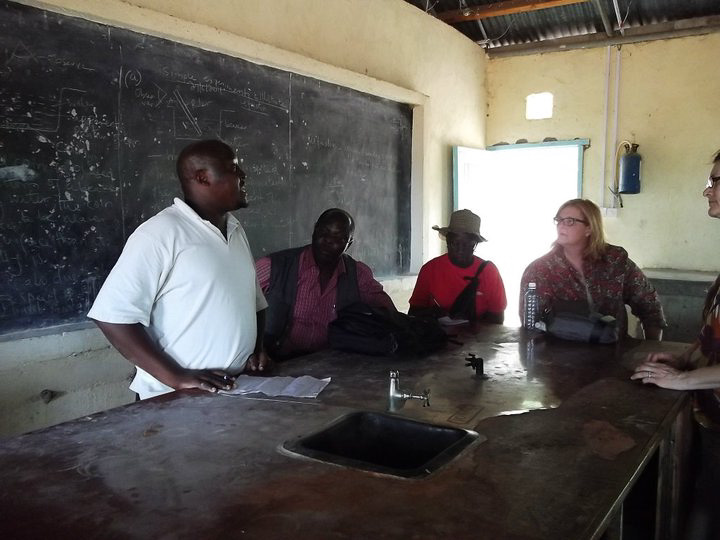Ubyssey
Thursday, November 01, 2012
By: Arno Rosenfeld

Teachers in Kenyan refugee camps, an initiative UBC and Kenya’s Moi University are partners in. Photo courtesy of Marina Milner-Bolotin
He and his family, fleeing from war, walked hundreds of miles from their home on the coast of Somalia to a semi-arid patch of desert across the border in a Kenya—Dadaab refugee camp. Ahmed was one of just eight students selected for a scholarship to attend university in Canada.
Now, UBC and a consortium of Canadian and Kenyan universities are looking to improve education for refugee students who are unable to qualify for the few scholarships provided by World University Service Canada (WUSC).
The initiative will target teachers in the camps, first providing them with teaching certification and then offering a handful of degrees cobbled together from online courses offered by universities in the consortium.
UBC’s Faculty of Education is working with Moi University in Kenya to provide teacher education for secondary-level instructors, while York University in Toronto and Kenyatta University in Kenya will offer certification for teachers at the primary level.
The Somali refugee students in the Dadaab refugee camp sit the same exams as Kenyan students, but their preparation is often inferior.
“To compete they need qualified teachers,” said Samson Nashon, a professor in the UBC Faculty of Education.
“You have teachers who have given their time and their energy…. All they lack is skills,” said Emmy Kipsoi, the head of Moi’s School of Education in Nairobi.
UBC will teach educational theory, while Moi will focus on technical instruction like physics labs, according to Nashon. Each university will offer 30 credits toward the 60-credit diploma, which will initially be granted by Moi.
UBC began their relationship with Moi four years ago and joined the Borderless Higher Education for Refugees (BHER) program two years ago, based out of the Centre for Refugee Studies at York.
BHER will send 400 students through the teacher certification program, followed by a two-year degree program offering majors such as public administration, public health and education, though UBC is currently only committed to the teacher certification aspect of BHER.
“It really is an idea whose time has come,” said Wenona Giles, co-leader of BHER. “We can’t have huge numbers of people not having access to higher education.”
Giles hopes that improving education in the camp will give refugees choices other than returning to Somalia, a country that is still plagued by violence despite being on the mend.
“It gives young people an option that is not entering the militia, that is not joining the pirates, that is not having to become a prostitute or a drug runner,” said Giles.
While aid organizations CARE Canada and Windle Trust Kenya provide free K-12 education in the camp, there is a lack of facilities and resources.
“If you go there, you find parents are sitting outside of schools just to ensure they are running,” said Nashon. “I’ve [seen] before some who just cried. This is [all] they want for their kids.”
But up until now, even those students who finish secondary school and do well on their exams are in a bind, unable to attend Kenyan universities because they are not citizens of the country.
Five years ago, when UBC President Stephen Toope was also serving as president of WUSC, Windle Trust Kenya approached WUSC to solicit assistance from Canadian universities to train teachers at the camp.
Toope asked UBC’s Faculty of Education to help. “Since then, we have been persistent in doing what it takes to make it happen,” said Rita Irwin, associate dean in the Faculty of Education.
Students in Dadaab admitted to BHER’s program will take courses online and in person at a learning centre that’s being built adjacent to the camp.
In addition to improving the lives of those receiving teaching certification and degrees, BHER hopes that creating hundreds of well-qualified teachers will improve life in the entire camp.
Nashon said one of the courses that BHER hopes will pay dividends beyond the classroom is peace education.
“[That course] is aimed at allowing these teachers to discuss the concept of peace,” he explained. “You would like teachers who have been exposed to various peace models. You wouldn’t want them to go [back to Somalia] and contribute to the conflict, but instead be peacemakers.”
Aside from their tangible work, UBC and BHER are seeking to perfect a model that could be used in long-term refugee situations around the world.
“We want to demonstrate that first of all it can be done,” Giles said of using technology to bring higher education to refugees.
While BHER’s plan for Dadaab is partially a pilot program, Nashon said that it’s unlikely UBC will abandon their work in the camp if funding is available after the initial $6 million grant from the Canadian International Development Agency runs out. The grant is in the process of being finalized now.
“If someone else is to [provide funding],… I don’t think UBC will say, ‘Nope, we’re out,’” Nashon said.
Giles added that since the grant pays for computers and the construction of the learning centre, any subsequent funding would be less costly.
Barriers remain for refugee students in the camp, even with the introduction of BHER.
“The schools are free, but the challenges are too many,” Ahmed said. “Still, when I talk to my friends, my classmates, my family, you see that people have this resolution in them: ‘We’re going to make it. It’s going to be okay.’
“People know the only way out of the refugee camps is education.”